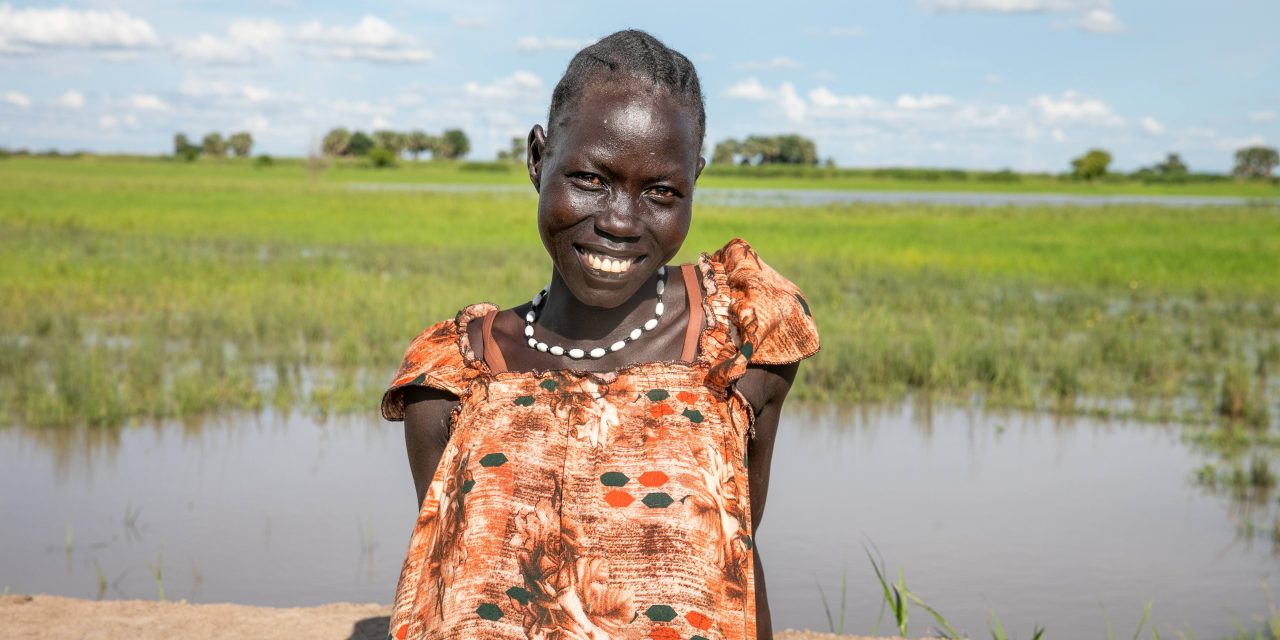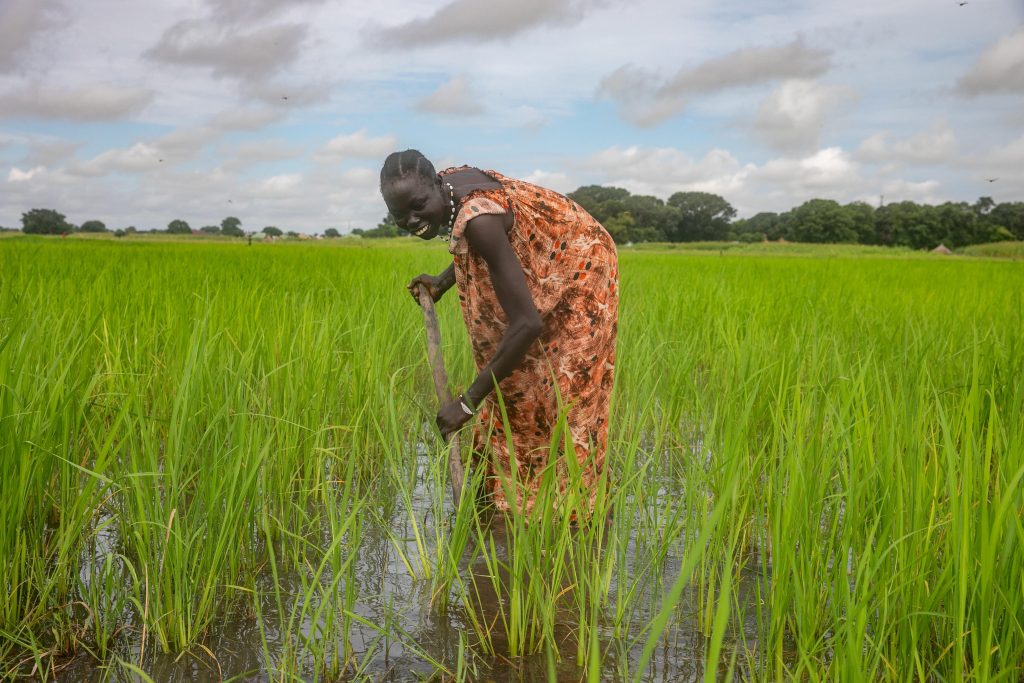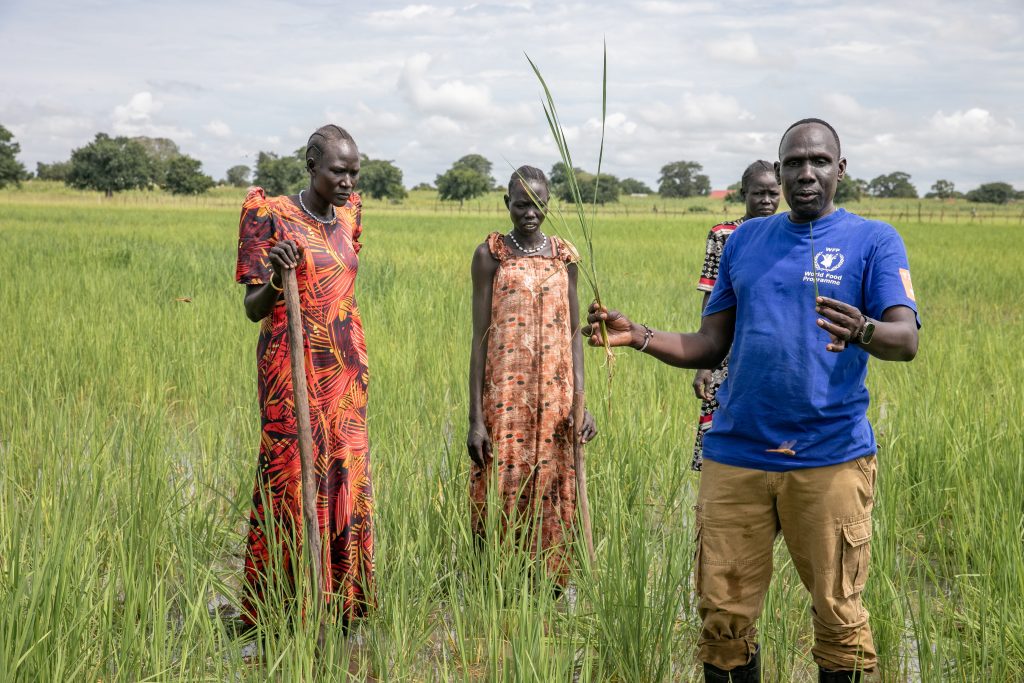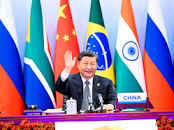
Floods, drought, and solutions: How WFP is empowering communities to combat the climate crisis in South Sudan

By Musa Mahadi
Amidst an expansive, green field of rice just outside Mathiang village stands a beaming Angelina Nyibol Akec. Behind the smile is a story of strength, survival, and resilience that is part of what defines many women in South Sudan.
In 2023 torrential floods severely damaged Angelina’s house, washed away her crops, and killed her livestock in Gogrial West County, Warrap State.
“I always kept sorghum and other foodstuffs in my house,” she explains. “But when the floods hit our village I lost everything, including my goats. I planned on selling the goats to get some money to educate my children.”
The floods were the latest in a series of shocks that had depleted Angelina’s coping mechanisms, including severe dry spells that had already reduced her yields and, consequently, income.
As world leaders meet in Azerbaijan this week at the UN climate conference (COP29) to try and reach agreements on climate action, for many communities in South Sudan the need for action is more immediate. Angelina’s story is not uncommon across South Sudan, the world’s youngest country is also one of the most vulnerable to the climate crisis and warming at a rate two and a half times greater than the global average, according to the United Nations.
The country has been simultaneously drowning and drying with unprecedented floods sweeping parts of the country and severe dry spells decimating crops and pasture in other parts. The lack of infrastructure in the nascent nation has exacerbated the impact of annual climate shocks, leaving a largely subsistence agricultural and pastoral population barely able to cope.
Transforming lives and livelihoods.
Well-positioned by its frontline operational footprint and expertise, the United Nations World Food Programme (WFP) is supporting communities as they tackle the climate crisis by investing in transformative resilience-building programs across the country.
In areas prone to flooding, such as Mathiang village where Angelina sought refuge after the floods wiped out her community, WFP has introduced rice, a crop that thrives in waterlogged environments.
The rice is cultivated in blocks where each participant is allocated a plot to manage from land preparation to harvest. The participants receive training in agronomic practices as they learn to grow and harvest a crop that is unfamiliar to many. Throughout the sessions, they also discuss various issues in their community, such as social cohesion, a key component in WFP programming in communities where intercommunal violence is common.
“I love working with the rest of the group because when we work together we finish the work faster and it brings unity among us,” says Angelina as she works on her rice farm. “When we work in groups, we can discuss our problems and find solutions together.”
WFP’s Programme Policy Officer, Karlo Madut Kuot, says the participants plant the BR4 rice variety suitable for lowland waterlogged conditions and sourced from the government Aweil rice scheme in Northern Bahr El Ghazal State.
With harvest season nearing, Angelina is optimistic that her life is bound to change.
“I hope when we harvest the rice, I’ll have enough to eat and sell at the market to send my children to school. Education would be my gift to these children,” she says as her voice breaks and her eyes teary.

Angelina is one of 4,000 smallholder farmers, 80 percent women, benefiting from the rice farming program in Warrap and Northern Bahr El Ghazal states. The program is part of WFP’s wider climate adaptation work across the country, which supports communities in building food security and livelihoods despite the climate shocks they’re experiencing.
These climate adaptation and mitigation programs are becoming increasingly important in today’s global context. However, none of them would be possible without the support from partners such as Canada, Germany, the European Union, Norway, Korea, and the United Kingdom, which are critical in building resilient communities across South Sudan.





































